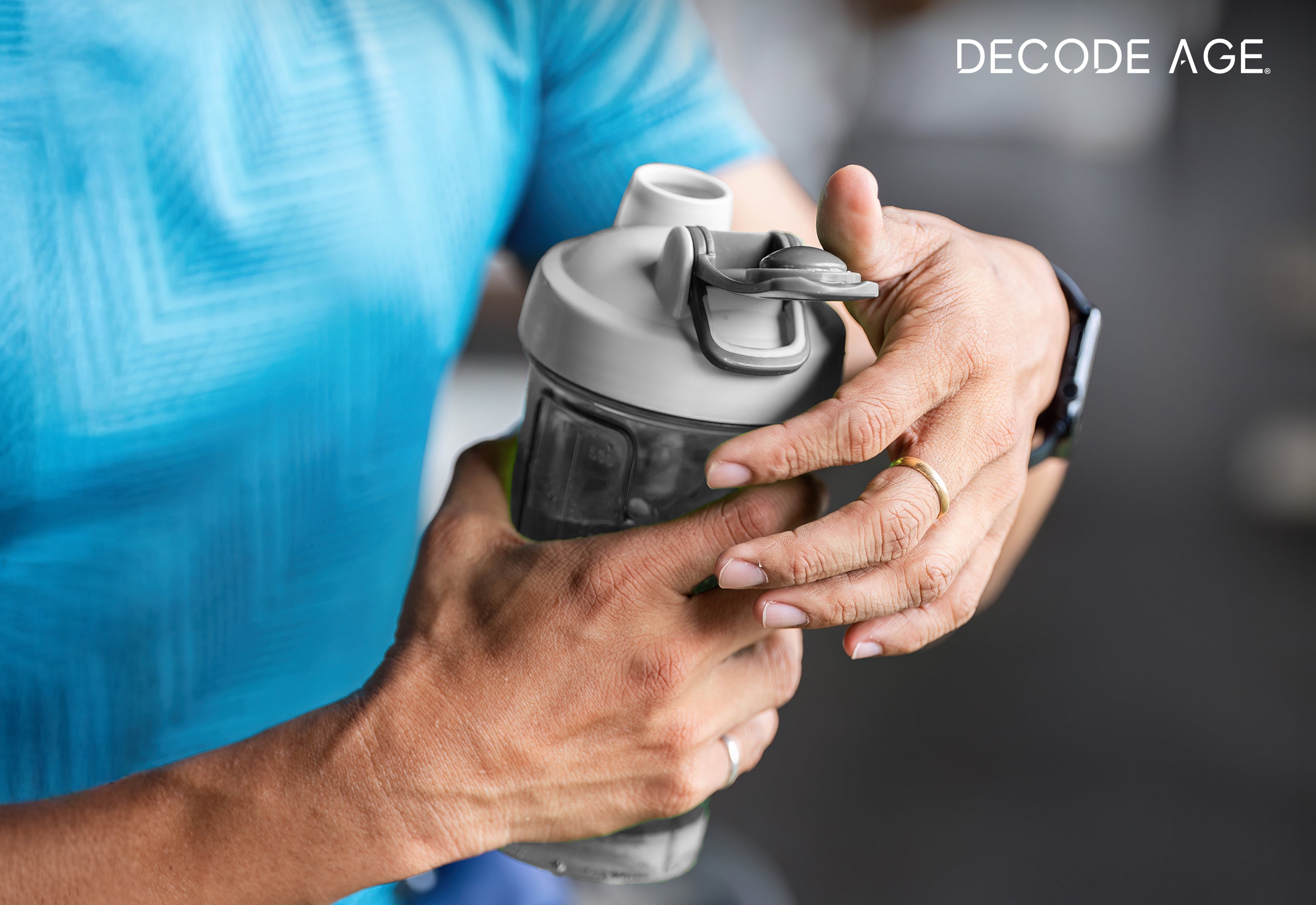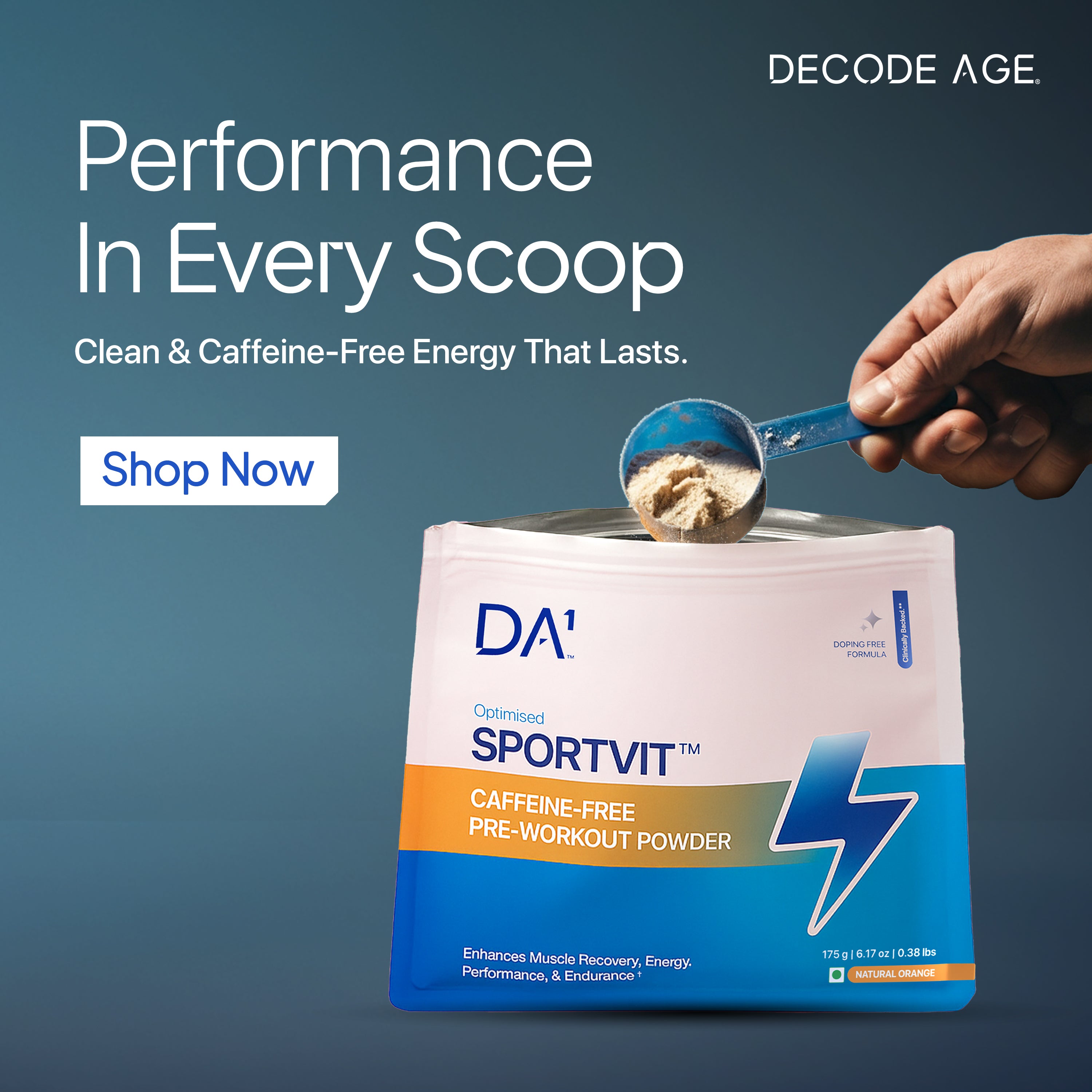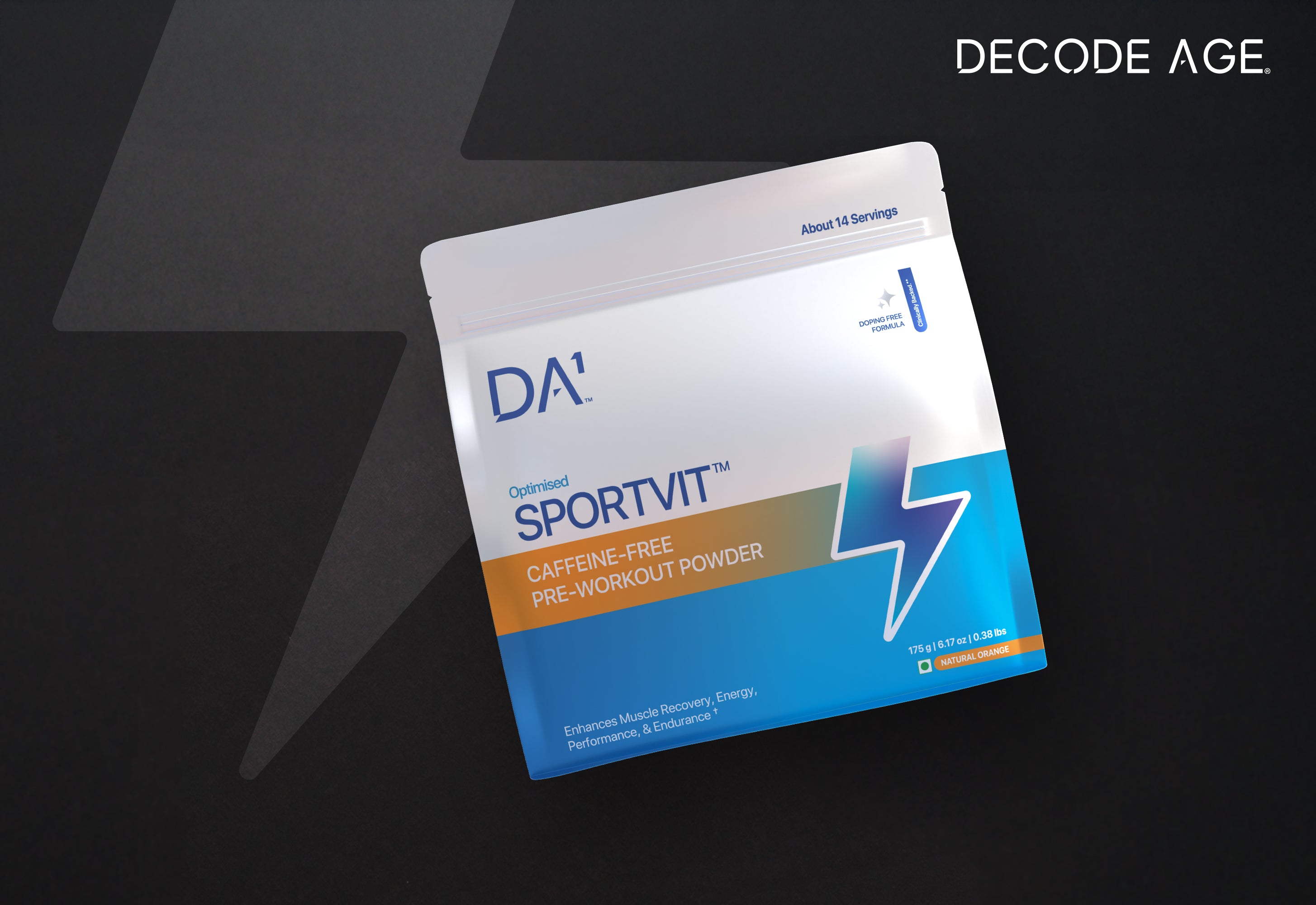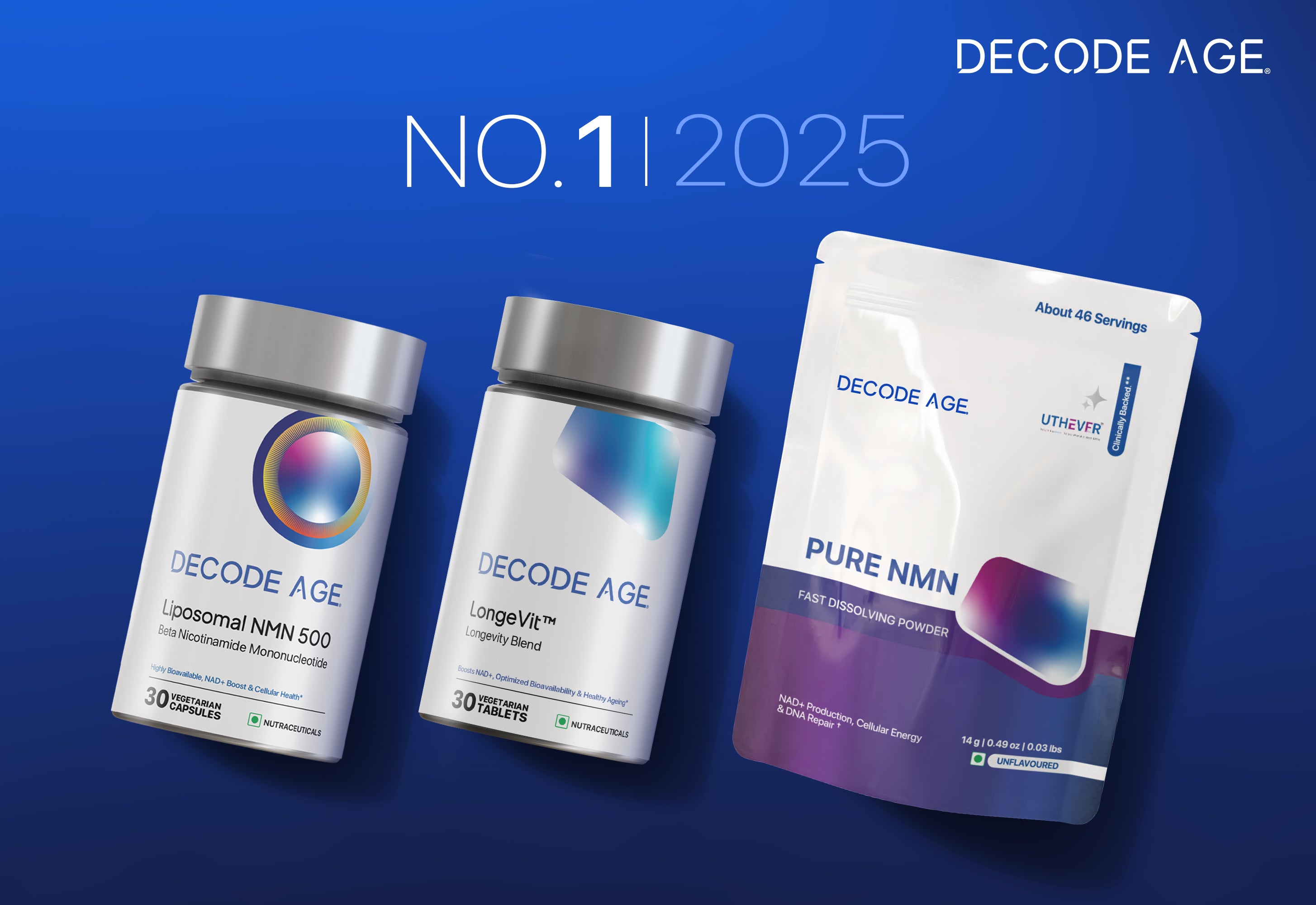Whether you're a seasoned athlete or just getting started on your fitness journey, you've probably heard of pre-workout supplements.
If you go to the gym or work out at home, you've likely seen people, especially those with visibly strong physiques, big biceps, or lean muscle, mixing or popping something before their session. Or maybe noticed it in movies or heard friends talk about their pre-workout rituals and wondered: do you need one too?
These popular blends promise more energy, better focus, and improved endurance. But do they actually deliver? And more importantly, are they right for you? This guide explores how pre-workout supplements work, their benefits and risks, and whether Decode Age’s stimulant-free option, Optimised SportVit—could be your next gym ally.
What Are Pre-Workout Supplements?
Pre-workout supplements, commonly known as “pre-workouts”, are products that are to be taken before exercise to enhance performance, increase energy levels, and sharpen mental focus. They typically come in powder or liquid form that can be mixed with protein shakes or smoothies. You would have probably seen gym-goers shaking their pre-workout bottles right before a set, like they're part of some pre-battle ritual; arms pumped, headphones on, ready to dominate the set.
These pre-workouts typically contain a mix of ingredients like amino acids, vitamins, minerals, and sometimes stimulants like caffeine. The goal is to help you push harder during workouts, lift heavier, or sustain longer endurance sessions.
These supplements are especially popular among athletes, bodybuilders, and fitness enthusiasts looking for an edge.
How Do Pre-Workout Supplements Work?
Pre-workouts typically contain ingredients that target both the mind and body to improve performance. The most common component is caffeine, which increases alertness and delays fatigue. Other core ingredients include:
- Creatine: Increases the body’s capacity to produce energy rapidly, especially helpful in high-intensity activities.
- Beta-alanine: Helps buffer lactic acid build-up, delaying muscle fatigue.
- L-citrulline and arginine: Increase nitric oxide production, improving blood flow to muscles.
- Branched-chain amino acids (BCAAs): May reduce muscle damage and soreness.
These compounds work by boosting energy production, improving blood circulation, enhancing mental focus, and reducing fatigue. The result? You can train harder, for longer, and with better results.
Benefits of Pre-Workout Supplements
Let's begin by highlighting the benefits of pre-workout supplements. To name just a few of the main components, beta-alanine, creatine, citrulline, taurine, tyrosine, and B vitamins are found in many pre-workout supplements. Here are a few benefits of pre-workout supplements.
Keeps You Energised for Longer
During resistance training, you might not be able to lift as much weight or execute as many repetitions as you did during the first set. By enabling you to complete more repetitions before your muscles give out, a pre-workout may help postpone this muscular tiredness. The caffeine in pre-workout is thought to be the cause of this effect.
Can Boost Power
Power is needed for sudden bursts of activity like sprinting, which is the quantity of work done in a specific length of time. It has been demonstrated that pre-workout increases the distance covered in 25 seconds of maximal effort sprinting. Put another way, pre-workout may help you set a new personal record for the 100-meter sprint.
Improve Endurance
While the effects of pre-workout on endurance performance have not been extensively studied, the preliminary findings are encouraging. In a particular study, individuals who took a pre-workout before engaging in a treadmill activity trial demonstrated a 12.5% increase in running distance compared to those who did not take the pre-workout (Jagim et al., 2016).
Improve Body Composition
While resistance training regimen, long-term pre-workout use has been shown to enhance lean muscle mass more than placebo. Alternatively, if you're new to training, pre-workout may aid in fat loss at a higher rate than exercise alone.
Cognitive Benefits
Pre-workout has both physiological benefits and also improves cognitive functions like focus, alertness, response time, energy perception, and pleasant emotions.
How to Choose the Best Pre-Workout Supplements
- Research has shown that several active ingredients in pre-workout supplements, such as caffeine, beta-alanine, taurine, creatine, nitrates, NAD+ precursors and BCAAs, are well-known for enhancing performance.
- You can adjust your selection to suit your individual needs and check product labels for any ingredients or additives you may wish to avoid. Since some pre-workout supplements contain artificial flavours and sweeteners, it's important to read labels carefully to ensure they align with your personal preferences.
- Additionally, since the FDA regulates supplements less strictly than it does medicines, choose products that have undergone third-party testing. This guarantees that the ingredient claims on the label are accurate.
How Optimised SportVit Supplement Will Help in Pre-Workout?
Unlike traditional formulas loaded with caffeine, Decode Age Optimised SportVit offers a balanced, holistic alternative. It combines scientifically validated ingredients to support energy at the cellular level, without causing overstimulation or energy crashes.
What’s inside Optimised SportVit:
- Nicotinamide Riboside (NR): A powerful NAD+ precursor that enhances mitochondrial function and cellular energy production. *
- Calcium Alpha-Ketoglutarate (Ca-AKG): Supports cellular metabolism and has been linked to healthy ageing and endurance enhancement. *
- Creatine: A well-researched compound that boosts ATP production, power output, and workout performance. *
- myHMB® (Calcium β-hydroxy β-methylbutyrate): Helps reduce muscle breakdown and supports lean muscle preservation. *
- Taurine: Aids hydration, muscular function, and reduces post-workout fatigue. *
- Inositol: Enhances neurotransmitter signaling for improved mood and focus. *
- Beta-Alanine: Increases muscle carnosine levels, buffering acid buildup and delaying fatigue. *
- L-Citrulline: Promotes nitric oxide production for improved blood flow and better pumps. *
Note: *Based on theoretical studies
It’s vegetarian, third-party tested, and formulated for clean energy without the side effects of stimulants. Ideal for those seeking longevity-focused performance support.
When to Take Pre-Workout Supplements
Pre-workout supplements should ideally be taken 30 to 60 minutes before exercising. This enables the essential components, such as caffeine and amino acids, to be metabolised and absorbed into the bloodstream, giving the needed energy boost for the activity.
Depending on each person's tolerance level and the particular supplement composition, the timing may change. If you take pre-workout too soon, its effects may diminish before the workout starts, and if you take it too close to exercise, the active ingredients may not be fully absorbed.
Apart from the timing, dosage and hydration matter equally. Start with the recommended dosage and increase (or decrease) only after consulting a healthcare professional. Also, drink plenty of water to support metabolism and prevent dehydration.
Note: Avoid combining with other caffeine sources or taking it too close to bedtime, especially if you’re caffeine-sensitive.
Are There Any Potential Side Effects of Pre-Workout Supplements
While many people experience only the benefits of pre-workouts, some may encounter mild to moderate side effects. These often depend on the ingredients used and individual sensitivities. Here’s a deeper look into common issues:
May Make You Feel Jittery
Caffeine is one of the most common ingredients in traditional pre-workouts. In high amounts, it can trigger symptoms like restlessness, anxiety, nausea, insomnia, increased heart rate, and even panic attacks in sensitive users. That’s why stimulant-free formulas like Optimised SportVit are growing in popularity, they energize without overstimulating.
Could Increase Water Retention
Creatine, though beneficial for strength and power, is known to cause temporary water retention, leading to a slight increase in weight. While muscle cramping and dehydration are reported anecdotally, these side effects haven’t been consistently shown in studies (Kreider et al., 2017b).
Might Upset Your Digestive System
Some ingredients, especially in higher doses, can cause bloating, diarrhoea, or nausea. For instance, magnesium citrate has a known laxative effect, and sodium bicarbonate taken in large amounts may also trigger stomach discomfort (Grgić et al., 2021).
Can Cause Headaches
Pre-workouts containing L-citrulline increase nitric oxide, which enhances blood flow. But in some users, this vasodilation can lead to headaches or even migraines due to increased pressure in the brain’s small arteries. Monitoring dose and hydration helps minimise this risk (Pradhan et al., 2018).
Might Cause Tingling Sensation
A unique yet commonly reported effect of beta-alanine is a tingling or prickly sensation on the skin, especially around the face, neck, or hands. This sensation, known as paresthesia, is harmless and usually subsides within an hour. While some users enjoy it as a sign their supplement is kicking in, others may find it uncomfortable. Adjusting the dosage or opting for a sustained-release version can help minimize this effect.
Understanding how your body responds and choosing transparent, well-formulated products can help avoid these side effects altogether.
Should You Take Pre‑Workout to Energise?
Pre-workout supplements can be incredibly helpful when used correctly and chosen wisely. They’re not magic pills, but tools to optimize your performance when paired with proper nutrition, sleep, and hydration.
Ultimately, deciding whether to take a pre-workout depends on your individual goals, health status, and how your body responds. While these supplements may enhance strength, focus, and endurance, they can also come with side effects, especially if ingredients aren’t well tolerated. That’s why it’s essential to choose third-party tested products with transparent ingredient lists and clinically studied components.
If you’re seeking a stimulant-free, research-backed pre-workout that supports both physical endurance and long-term vitality, Decode Age Optimised SportVit offers a powerful yet gentle option.
As with all supplements, listen to your body. Start slow, monitor how you feel, and speak with a healthcare professional before starting, especially if you have sensitivities or underlying health conditions.
FAQs
Are pre-workout supplements safe for everyone to use?
Although many people find pre-workouts to be safe, they might not be the right choice for everyone. Before utilising such supplements, anyone with special medical conditions, stimulant sensitivity, or those taking particular prescriptions should speak with a healthcare provider. Furthermore, moderation is essential to prevent any negative effects like heart palpitations, sleeplessness, or intestinal problems. Before adding pre-workout supplements to their regimen, people with cardiovascular conditions, those who are pregnant or nursing, and others should use prudence and professional assistance.
Do pre-workout supplements have any side effects?
Pre-workout supplements do have potential negative effects. Common ones, mostly because of substances like caffeine, include jitteriness, elevated heart rate, stomach problems, and trouble falling asleep. Furthermore, some people may get headaches or migraines, especially if they use substances like citrulline that alter blood flow. To reduce the possibility of negative effects and guarantee a secure and productive workout, it is critical to be aware of individual tolerance levels, component sensitivities, and appropriate dosage.
When is the best time to take a pre-workout supplement?
A pre-workout supplements should be taken 30 to 60 minutes before working out. throughout this window, essential substances can be properly absorbed and digested, increasing their potency throughout the exercise. The supplement's formulation and each person's tolerance may influence when to take it. Consuming it too soon could cause its effects to diminish before the workout while taking it too close to exercise could result in incomplete absorption.
Can pre-workout supplements cause overstimulation or jitters?
Yes, because pre-workout supplements include a lot of caffeine, they might cause jitters and overstimulation. When taken in excess, caffeine, a stimulant of the central nervous system, can increase alertness, restlessness, and anxiety. Since everyone has a different threshold for caffeine, taking pre-workout pills in excess can have these unintended side effects. This emphasises the need for moderation and understanding one's level of sensitivity.
Can I take pre-workout supplements on an empty stomach?
Although it's normally possible to take pre-workout supplements on an empty stomach, it's essential to take individual tolerance into account. When taking these supplements without food, some people may feel queasy. A quick meal or snack before consumption can lessen the risk of stomach problems. Try out different times to see what suits you the best, but bear in mind that everyone responds differently to pre-workout vitamins.

























Leave a comment
All comments are moderated before being published.
This site is protected by hCaptcha and the hCaptcha Privacy Policy and Terms of Service apply.